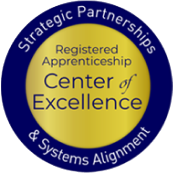Preparing students for the workforce and apprenticeship-based career pathways starts in school. Secondary and post-secondary education institutions can play a key role in apprenticeship through awareness building, providing required related instruction for apprentices, and even sponsoring programs.

| Body | Resource Date | Resource Link |
|---|---|---|
Rural community colleges face unique challenges when implementing Registered Apprenticeship programs. In this webinar, Safal Partners Workforce Director, Dr. Melissa Schroeder, hosted a discussion with David Shofstahl, Apprenticeship Coordinator and Workforce Program Manager for Skilled Trades at Mountain Gateway Community College (MGCC). As a recognized leader in workforce development, David has navigated unique challenges of implementing Registered Apprenticeship programs in rural areas. MGCC, the second smallest community college in Virginia, has utilized innovative approaches to overcome significant barriers to apprenticeship adoption. Dr. Melissa Schroeder also offers her insight into the challenges and opportunities facing community colleges.
|
||
Apprenticeships for America (AFA) hosted the 2025 AFA Summit featuring five plenary sessions, twenty breakout sessions, and a tech expo. The Summit focused on addressing timely issues facing apprenticeship, including sustainability and scaling, state and regional policy and practices, strategies for advancing success in apprenticeship, and the evolving roles of intermediaries. The conference also explored apprenticeship recruitment and pipeline development, the involvement of community colleges in apprenticeship, degrees and apprenticeship, and youth apprenticeship, as well as provided opportunities for participants to attend sector-focused sessions. This presentation was presented at the Apprenticeships for America Summit and provided insights to national education, apprenticeship, and workforce leaders on closing the gaps between America's public workforce and Registered Apprenticeship systems to increase alignment. |
https://dolcoe.safalapps.com/sites/default/files/2025-09/AFA%20Summit%202025%20… | |
The Workforce Development Institute 2025: Uncharted Courses was an opportunity to engage with thought leaders and innovators in workforce and economic development. Participants heard Center staff moderate an interactive panel discussion designed to provide insight for colleges looking to position talent and potential funding streams for RA in their communities. The panel included Anthony Cordova, Vice Chancellor of Workforce and Economic Development at California Community College; Marvin Martinez, Chancellor of Rancho Santiago Community College District; and David Shofstahl, Apprenticeship Coordinator at Mountain Gateway Community College. |
https://dolcoe.safalapps.com/sites/default/files/2025-09/Finding%20Your%20Organ… | |
Increased engagement between Registered Apprenticeship and Workforce Innovation Opportunity Act (WIOA) Title I and Title II programs and a deeper collaboration between these two complementary systems can contribute to the expansion of Registered Apprenticeship. Two recent surveys of workforce development and adult education providers conducted by the U.S. Department of Labor Registered Apprenticeship Technical Assistance Center of Excellence on Strategic Partnerships and System Alignment indicate that, while capacity exists among WIOA service providers to design and deliver pre-apprenticeship and Registered Apprenticeship programs, much more can be done to leverage these programs’ respective strengths for greater impact. This report provides a summary of the findings of these surveys and discusses opportunities for deepening the engagement of, and collaboration among, WIOA Title I and Title II service providers in supporting pre-apprenticeship and Registered Apprenticeship programs. |
||
The Center presented this interactive workshop during ACTE’s CareerTech VISION 2024 to help employers of all sizes and all sectors expand their workforce recruiting and development strategies by adopting Registered Apprenticeship. Career and technical education (CTE) programs are expertly positioned to accelerate student’s successful entry into these programs through development of strategic partnerships and industry-aligned pre-apprenticeship programs. The Center also showcased how we can provide your state and local CTE leadership, and individual program instructors, with customized, no-cost TA, resources, and tools to engage in pre-apprenticeship. |
||
2024 ApprenticeshipPA brought together industry, education, workforce, and stakeholders across Pennsylvania that wanted to strengthen apprenticeship employment and work-based models of training and development. Center subject matter experts presented the workshop, Building Student Awareness of Apprenticeship Career Pathways. This workshop provided insights into how education can seamlessly transition into apprenticeship. Data and statistics were shown highlighting the impact and success rates of Registered Apprenticeship (RA) programs, exploring the many benefits of combining traditional education with RA, such as enhanced skills acquisition, job readiness, and long-term career success. |
||
Maryland's employers are struggling to fill jobs, while parents face the rising costs of college. The state has also set an ambitious goal: by the 2030-2031 school year, 45% of graduating seniors should complete an apprenticeship or earn an industry-recognized credential. Achieving these objectives will require a significant expansion of youth apprenticeships across the state. This workshop provides insights into how education can seamlessly transition into apprenticeship. It presents data and statistics highlighting the impact and success rates of Registered Apprenticeship (RA) programs and explores the many benefits of combining traditional education with RA, such as enhanced skills acquisition, job readiness, and long-term career success. Industry experts share examples of successful education-to-apprenticeship pathways. This presentation equips you with the strategies and knowledge to bridge the gap between education and apprenticeship, ultimately benefiting both students and the workforce.
|
||
This Center of Excellence webinar was designed to empower educators, practitioners, and stakeholders with the knowledge and tools needed to seamlessly connect education with Registered Apprenticeship (RA) programs. Attendees gained insights into how education can effectively transition into apprenticeship, heard comprehensive data and statistics that highlight the impact and success rates of RA programs, and learned about the myriad of benefits of combining traditional education with RA, including enhanced skills acquisition, job readiness, and long-term career success. Industry experts also provided examples of successfully implementing education-to-apprenticeship pathways. This informative and engaging session equipped you with the strategies and knowledge to bridge the gap between education and apprenticeship, ultimately benefiting students and the workforce. |
https://vimeo.com/1002014700/3f9e973610?share=copy | |
Center partner, the Coalition on Adult Basic Education (COABE), held their Annual Conference in Nashville, TN in 2024. Center subject matter experts, Katie Adams, Nicole Klues, and Dr, Amber Gallup, presented about expanding pre-apprenticeship opportunities for adult learners through employer engagement to grow their registered apprenticeship program. This interactive session explored tools and strategies for fostering strong partnerships between adult education programs and employers to enhance pre-apprenticeship and registered apprenticeship opportunities for students. |
Unlocking Registered Apprenticeship and Pre-Apprenticeship Opportunities | |
Properly implemented supportive services can ensure higher retention rates for apprentices in skilled, nontraditional occupations. However, most Career and Technical Education (CTE) programs don’t have a framework for working with state or federal grant programs or their local workforce development board (LWDB) to access Workforce Innovation and Opportunity Act (WIOA) and non-WIOA funded supportive services for their youth or adult apprentices. Learn how one CTE Center works with its LWDB and braids state and federal apprenticeship grant funding to provide critically-needed supportive services to apprentices. As a Registered Apprenticeship program sponsor, the Special School District of St. Louis County’s Adult CTE Department has implemented a promising programmatic model and support service delivery practice for its multi-occupation adult apprenticeship programs, including Certified Nurse Assistant, Certified Medication Technician and Level One Medication Aide, as well as its “Healthcare S.T.A.R.S.” Pre-Apprenticeship program. These practices range from mentoring, case management, and linkages with community services partners to providing financial assistance with childcare, transportation, housing, and utility costs. This presentation was given during the Association for Career and Technical Education (ACTE) CareerTech Vision 2023 workshop. |
